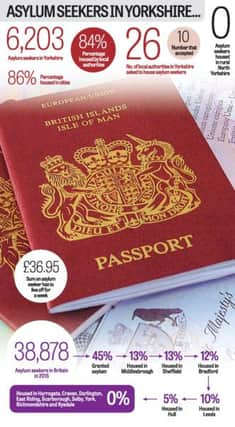Analysis: Why Yorkshire's small, rural communities have shut door on asylum seekers


Across the region, Yorkshire’s big cities have opened their doors to those in need, while smaller communities and councils have said they simply cannot.
A lack of infrastructure, a shortage of funds, and prioritising the Government’s Syrian refugee resettlement scheme have all been cited as reasons for refusing.
Advertisement
Hide AdAdvertisement
Hide AdBut for those who have crossed the world to make Yorkshire their home, there is nothing which could make them feel less welcome.
“They are seeking asylum because they are afraid - this is life and limb stuff,” said Jon Beech, director of Leeds Asylum Seekers Support Network (LASSN).
“It could be that they are gay in Uganda,” he said. “A Christian in Iran. Fleeing a 10-way civil war in the Sudan.
“It boils down to being afraid for their safety. You can’t claim asylum because you’re poor.
Advertisement
Hide AdAdvertisement
Hide Ad“Councils could step up more. If residents in rural areas are worried about school places, then fair play. If they are worried about hospital beds, housing, then fair play. But I’m not sure that’s the case.
“We’re not looking at large numbers of people - 626 in Leeds with a population of 800,000. That’s less than 1 per cent. It makes you wonder what they’re afraid of.”
The figures show that big cities have taken the bulk of asylum seekers for the Yorkshire region, 84 per cent of 6,203.
Local authorities including Selby, Craven, Scarborough and Richmondshire have refused, while York, Harrogate and Ryedale say they haven’t been asked.
Advertisement
Hide AdAdvertisement
Hide AdA number of cities have expressed their preference for a “fairer system”, with dispersion spread out across all communities. Others have said they are glad to play their part.
“We are proud to be a city of sanctuary,” said Bradford Council Leader, Coun Susan Hinchcliffe. “We intend to continue offering a safe haven to people fleeing unimaginable persecution.”
The numbers across the region are not huge, and they do not compare to other parts of the country like Glasgow, Rochdale or Bolton which all feature in high concentration tables per member of the population.
And while Yorkshire is experiencing a rise in numbers, Migration Yorkshire has said, these are well below the peak of the last decade.
Advertisement
Hide AdAdvertisement
Hide AdFor each asylum seeker who has arrived in Yorkshire, Wakefield is home for a few short weeks. Then, when another authority agrees to house them, they are moved on.
“They are found a place, in Wolverhampton, or Barnsley, or wherever,” said Mr Beech. “They don’t get a choice. They go where they are told to go. And it’s limited by money, so they only go to the very poor areas.
“Leeds City Council has been brilliant. They have said they don’t want people to share rooms - that’s not the case in every city.
“They might be forced to share a room with someone they don’t know, who doesn’t even speak their language.
Advertisement
Hide AdAdvertisement
Hide Ad“It’s like living life in a prison cell. They don’t have a great lot to do - they don’t have the right to work. They have maybe £5 a day to live off.
“It’s pretty bleak. Without a shadow of a doubt, they do start to lose their very reason to be.
“These are dentists, doctors, university lecturers. They are skilled. And they’ve got nothing to do.
“It’s a real shame. In the Second World War, we used to welcome refugees with a bit of gumption.”
Advertisement
Hide AdAdvertisement
Hide AdMr Beech says it’s not surprising that communities in rural areas, where there is a chronic housing shortage, are struggling to find the resource. But, he added, there needed to be shift change in attitudes.
“There’s a physical will, in places like Bradford, Leeds and Barnsley, to say ‘they are welcome here’,” he said. “Councils can do more.”